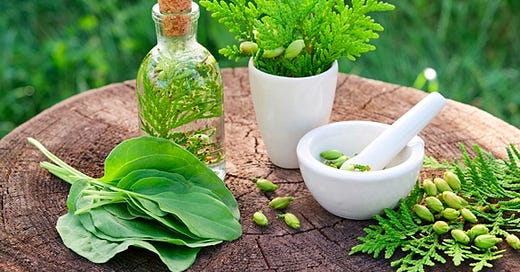Unveiling Nature's Pharmacy: The Art of Herbal Medicine in Daily Life
"Unlocking Nature's Healing Secrets: Explore the Art of Herbal Medicine in Daily Life for Holistic Wellness and Timeless Well-Being."
Introduction
In a world increasingly dominated by modern medicine, the age-old practice of herbal medicine has not lost its relevance. The art of harnessing the healing power of plants has been an integral part of human history, dating back to ancient civilizations. In this edition of "Ancient Wonders," we delve into the rich tapestry of herbal medicine and explore how it continues to weave its magic into our daily lives.
The Roots of Herbal Medicine
Herbal medicine traces its roots to the very beginnings of human civilization. Ancient cultures, such as the Egyptians, Greeks, and Chinese, recognized the therapeutic properties of plants and incorporated them into their healing practices. The knowledge of herbs was often passed down through generations, fostering a deep connection between communities and the natural world.
The Wisdom of Nature
At the heart of herbal medicine lies the profound understanding that nature provides us with a vast pharmacy. Plants have evolved over millions of years, developing an array of chemical compounds with unique healing properties. This wisdom is embodied in each leaf, stem, and root, waiting to be unlocked and utilized for the improvement of human health.
Herbs in Everyday Life
One of the most remarkable aspects of herbal medicine is its accessibility. Unlike pharmaceuticals, many herbs can be grown in our gardens or sourced from local markets. Integrating herbs into our daily lives is a simple yet powerful way to prioritize holistic well-being.
1. Culinary Herbs as Medicine:
The herbs we commonly use in our kitchens are not just for flavor; they often come with a plethora of health benefits. Take rosemary, for example, known for its cognitive-enhancing properties. By infusing our meals with such herbs, we not only elevate the taste but also infuse our bodies with natural medicine.
2. Herbal Teas and Infusions:
Tea has been a staple in various cultures for centuries, and herbal teas go beyond offering warmth and comfort. Chamomile helps with relaxation, peppermint aids digestion, and ginger serves as a potent anti-inflammatory. Crafting a cup of herbal tea becomes a ritual that nourishes both body and soul.
3. Medicinal Gardens:
For those with a green thumb, cultivating a medicinal garden can be a fulfilling journey. Growing herbs like lavender, echinacea, and aloe vera provide a readily available source of remedies for common ailments. It also fosters a deeper connection with nature and a sense of self-sufficiency.
The Modern Renaissance
While traditional herbal practices persist, there has been a resurgence of interest in herbal medicine in recent years. People are turning to herbal remedies for various reasons, including a desire for natural alternatives, a holistic approach to health, and a renewed appreciation for ancient wisdom.
1. Herbal Supplements:
The market for herbal supplements has seen a significant uptick as people seek to complement their diets with natural remedies. From ginseng for energy to turmeric for its anti-inflammatory properties, these supplements offer a convenient way to integrate herbs into modern, fast-paced lifestyles.
2. Integrative Medicine:
The integration of herbal medicine into conventional healthcare is gaining recognition. Some healthcare practitioners now combine traditional medical approaches with herbal remedies, highlighting a comprehensive approach to patient well-being.
3. Mind-Body Connection:
Herbal medicine is not just about physical health; it also addresses the mind and spirit. Practices like aromatherapy, where essential oils derived from herbs are used, demonstrate how the scent of certain plants can positively impact mood, stress levels, and overall mental well-being.
The Future of Herbal Medicine
As we navigate an era of technological advancements and scientific breakthroughs, the relevance of herbal medicine persists. The future may see a harmonious integration of traditional wisdom and modern scientific understanding, unlocking new potentials in the field of natural healing.
1. Scientific Validation:
Research into the medicinal properties of herbs is advancing, providing a scientific basis for the efficacy of traditional remedies. As we understand the biochemical mechanisms behind herbal actions, we can optimize their use and explore new possibilities for treatment.
2. Sustainable Practices:
The cultivation and harvest of medicinal plants must be approached sustainably to ensure the longevity of herbal medicine practices. Ethical sourcing, conservation efforts, and community involvement will be crucial in preserving the delicate balance between humanity and nature.
3. Personal Empowerment:
As individuals take greater responsibility for their health, the use of herbal medicine becomes an empowering choice. Education and awareness will play pivotal roles in fostering a culture where people can make informed decisions about their well-being.
Conclusion
In the intricate dance between nature and humanity, herbal medicine emerges as a timeless partner. From the kitchens of our ancestors to the laboratories of today, the art of herbal medicine persists, offering a holistic approach to health that resonates across cultures and time. As we continue to unravel the mysteries of the natural world, let us not forget the ancient wonders that have been with us all along, patiently waiting to heal and nourish.




